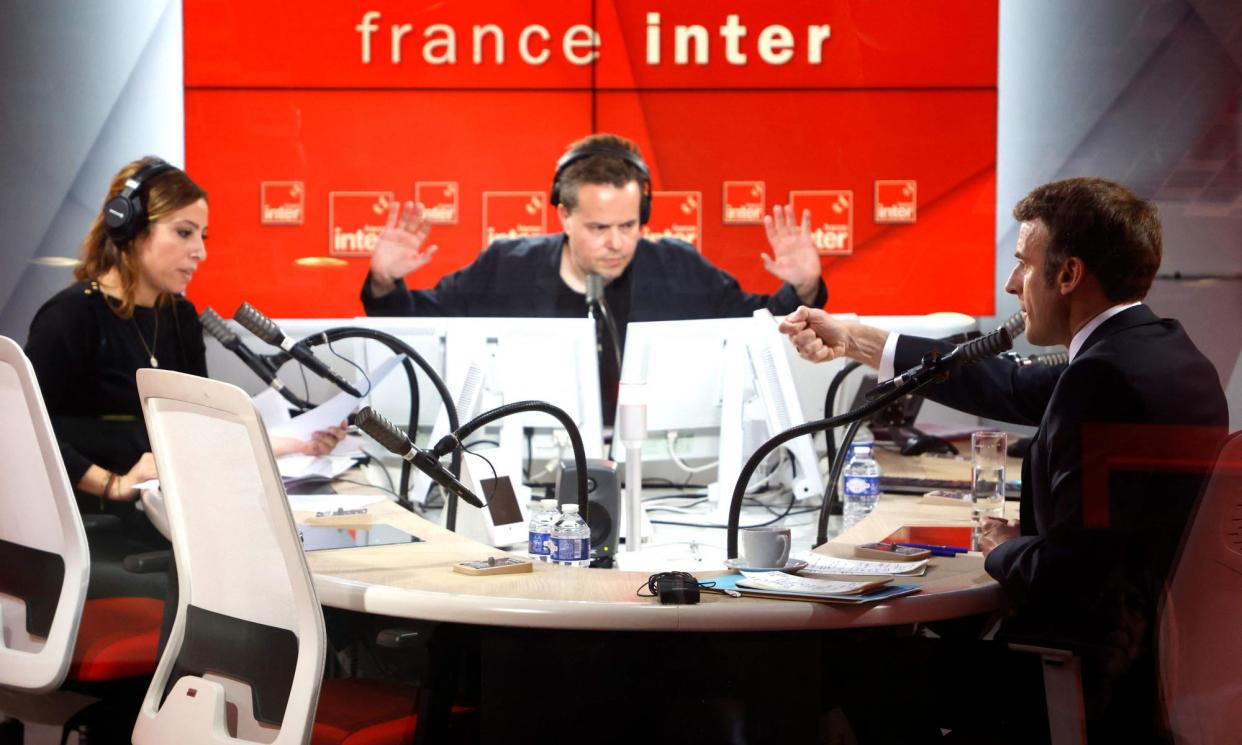National Rally says it would privatise French public TV if it wins majority

Marine Le Pen’s far-right National Rally intends to privatise public television and radio if it wins an absolute majority in the French parliament in snap elections, senior party figures have confirmed.
Jordan Bardella, the party president, told France 3 public television on Sunday that his ambition was to privatise state broadcasting “in order to save money”.
He said selling off the public radio and television services would save more than €3bn (£2.5bn), which could fund other policies. He said the measure would take time and “wouldn’t happen in 24 hours”.
Sebastien Chénu, the party’s vice-president, said in an interview on France 2 that public TV and radio in France needed “a bit of liberty, some oxygen”. He said certain big programmes on national radio stations “lean to the left or far left” and there should be “no taboos” about privatisation.
Chénu said the party intended to sell off national TV and radio stations but hold on to international channels that were the voice of France abroad, such as France 24 and Arte, as well as channels in overseas territories such as Martinique and Guadeloupe.
Macron announced on 9 June that he was calling parliamentary elections, in a dramatic gamble after the far right largely defeated his centrists in European elections. The outcome is uncertain and Le Pen’s party is polling strongly.
Related: French elections: who are the key players and what is at stake?
The public broadcaster France Télévisions, which includes four national TV channels and 24 regional channels, is a key financier of films, drama and documentaries and is the top French media outlet. Radio France has several national and local stations and dominates podcasting. Its public radio station, France Inter, is the most popular in France, with more than 7 million listeners a day.
Clémentine Autain, a candidate for the left alliance, the New Popular Front, said voters must choose the left in the election to “avoid carnage” in public broadcasting.
The row over privatisation comes at a delicate time for French state TV and radio, which has been weakened by the scrapping of a licence fee and faces uncertainty over its future funding model.
In 2022, Macron scrapped the TV licence fee of €138 (£115) a year in mainland France. Since then, public broadcasting has been funded by a fraction of VAT, but that short-term fix will end next year.
When Macron suddenly dissolved parliament in the aftermath of the European elections, the legislation that was left hanging included plans to decide how public media could be independently funded.
In addition, public broadcasters went on strike last month after Macron’s culture minister, Rachida Dati, proposed merging public media companies. Journalists’ unions accused Macron of trying to recreate the ORTF, the structure that brought together French public broadcasting until the 1970s, whose lack of independence was criticised.
Alexis Lévrier, a media historian at the University of Reims, said: “For the RN, public broadcasting is a target. The privatisation they are thinking of is a way to try to silence media they accuse of being woke, leftist and opposed to their ideology. It is to silence a media they see as too insolent.”
He said if the RN gained control of parliament and did decide on privatisation, they would choose to sell it to “media bosses close to their ideas”.
But he said it was also possible that, once in power, the RN may instead decide to keep a weakened public service and control it. “If public broadcasting stays public but in the hands of the RN then Macron would have made the work of the far right easier by weakening the public broadcasters through scrapping the licence fee and with his merger plans that destabilised the media.”
He said: “Public broadcasting in France is in a paradoxical situation where it has never had such large audiences and high satisfaction ratings from viewers and listeners, but has never been so fragile.”
The French media landscape has been a topic of soul-searching about far-right culture wars since the conservative Catholic billionaire Vincent Bolloré consolidated his media empire with acquisition of the Sunday paper Le Journal du Dimanche, the radio station Europe 1 and the TV channel CNews.
CNews, which is dominated by heated talkshows focusing on immigration and crime, recently became the most watched information channel on French TV. The former education minister Pap Ndiaye once described it as “very close to the most radical far right”. Pascal Praud, a star of CNews and a columnist in Le Journal de Dimanche, has claimed leftwing media are jealous of the media group’s success.
Le Monde reported on Monday that while many in government were kept in the dark about Macron’s intention to dissolve parliament and call elections, Praud was called by the Élysée and informed before the prime minister, Gabriel Attal.

 Yahoo News
Yahoo News 